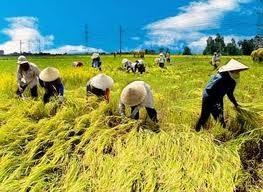(VOVworld) - Although much attention has been paid to investment in agriculture, farmers, and rural areas (the three-agro industry) over the past years, the sector’s potentials haven’t been fully tapped. Deputies agreed at yesterday’s National Assembly session that effective policies and solutions are needed to further mobilize capital from businesses and other sectors in this field. Anh Huyen reports:
Statistics show that Viet Nam invested more than 430 trillion VND or 20.7 billion USD in agriculture, farming and rural areas over the past five years, amounting to nearly 50 per cent of the total development funds from state budget and government bonds. Public investment in agriculture has transformed the lives of millions through improving infrastructure, increasing production, creating jobs and implementing poverty reduction programmes. However, most ministries, departments, and localities have faced a shortage of for investment in the three-agro industry, cited Chairman of the NA Economic Committee Nguyen Van Giau in his report at Tuesday’s National Assembly session. Giau said: "Due to complicated topographical conditions, remote and mountainous areas, and low tech productions, farmers’ living conditions remain poor. The government aid and social investment in this field is limited, while the risk of agricultural production suffering from adverse impacts of the climate change, environmental pollution and epidemics is high. This has caused many difficulties attracting business investment to this sector."
 |
It is necessary for the government to upgrade policies and legal documents on public investment for agriculture, farmers, and rural areas to better attract investment to this field. The confusion, overlapping, and contradiction of various legal documents have led to poor implementation and mismanagement. A lack of comprehensive supervision measures has caused too many investment projects to be approved without consideration for available capital resources. Moreover, limiting the land lease period as stated in the current Land Law had created obstacles for agriculture and farming production. Deputy Nguyen Thu Anh, who represents the central highlands province of Lam Dong, said: "I suggest reviewing in detail the current situation of land use nationwide. It’s very necessary to define the major land reserve for agriculture, especially for rice cultivation. Meanwhile, we have to ensure justice while reclaiming land, reiterating the government’s stance of leasing land to farmers in a stable and long-term manner to create favorable conditions for their production."
Many deputies propose that more attention should be paid to a comprehensive infrastructure upgrade, especially in remote and island regions to attract more investment. They stress such incentives relating to credits, market development, tax, scientific and technological development, vocational training, and jobs for farmers. Local authorities should be empowered to implement every detail of the projects under the supervision of the main governing body. Consensus should be reached on the importance of human resources development, which plays a key role in the construction of new rural areas. Deputy Nguyen Bac Viet, representing the southern Ninh Thuan province, said: "We need high quality staff to create breakthrough initiatives for development. I propose the National Assembly apply a better salary policy for staff at the grassroots level, especially in remote areas, before year end to encourage them to further contribute to the development of new rural areas."